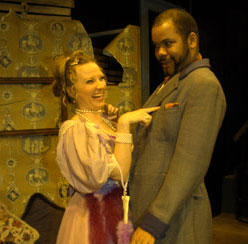
The American Legacy
Office: 212 995 8410 ~ Tickets: 212 995 5302
 |
Metropolitan
Playhouse
The American Legacy 220
East Fourth Street ~ New York,
New York 10009
Office: 212 995 8410 ~ Tickets: 212 995 5302 "One
of my favorite downtown theaters"
~ Martin Denton, nytheatre.com
|
||||||||
| Playing | Next | Season | Tickets | Jobs | Location | Mail List | History | Classes | |
| Reviews - Fashion | |
Fashion by Martin Denton for nytheatre.com · April 13, 2003 Fashion is, I believe, the oldest American play I have ever seen. There aren't very many older ones; certainly not many that would seem worth doing apart from their curiosity value. Fashion, which was written by Anna Cora Mowatt in 1845, is absolutely worth doing, as Alex Roe's present production at Metropolitan Playhouse indisputably proves. Not only does it offer a fascinating and unique glimpse at the American Character--a useful exercise at any time but a particularly appropriate one these days, I'd say--but it also proves to be a surprisingly modern, entertaining comedy of manners. Oh it's dated all right, but Roe and his spirited cast play it just broadly enough--big, but with no winking--to make Fashion a merry evening of theatre. It all takes place in the too-grand-for-its-own-good home of Mr. and Mrs. Tiffany in New York City. He was once a traveling peddler who sold goods from a pack on his back; she worked in a millinery shop in the Lower East Side. Prosperity has made him into a nervous entrepreneur and her into an overblown poseur whose pretensions and extravagances have driven her husband to commit forgery in an attempt to pay the mounting bills. Mrs. Tiffany lives for Fashion; she has imported a French maid named Millenette to apprise her of all the latest trends in Parisian haute couture; she speaks an affected parlance littered with mispronounced French phrases and fawns shamelessly over Count Jolimaitre, the handsome, heavily-accented, mustachioed grandee who is wooing her giddy daughter Seraphina. Of course, Jolimaitre is a fake; we figure this out even before Millanette telegraphs it to us when she recognizes him as her former lover, a one-time cook. The so-called Count also makes the moves on Gertrude, the plainspoken young woman who works in Mrs. Tiffany's conservatory; Gertrude, who is just about the only character in the play entirely without affectation, bungles her plan to expose Jolimaitre as a fake and winds up in hot water with Colonel Howard, the man who loves her. Oh, and I haven't mentioned Mr. Snobson, the scheming clerk who is blackmailing Mr. Tiffany, threatening to expose his boss's crimes unless he is allowed to marry Seraphina himself. The day is saved for everyone concerned by Adam Trueman, the none-too-subtly named 72-year-old farmer who just happens to be visiting the Tiffanys when all of these convoluted occurrences occur. Trueman, in buckskin and raccoon fur hat, is the only person in the play not somehow or other enslaved by Fashion, as he is wont to remind anyone who will listen; he's the one "true American" in sight, embodying the principles of rugged individualism, honesty, hard work, and unadorned simplicity. He is, frankly, insufferable; it's absolutely fascinating to look at this presumed paragon of ante-bellum virtue and compare his values to our own. Which is the point of Roe's revival of Fashion: his staging offers just enough wry commentary on Mowatt's play to help us focus on what it seems to have stood for. He's cast an African American actor, Henry Afro-Bradley, as Trueman, to provide a hint of irony; he's also cast the hilariously over-the-top Tod Mason as Mrs. Tiffany, who, despite the hair on his arms, performs here decidedly not as a drag artist--his vaguely brutish bravado seems entirely natural, even essential to the character (his casting feels as on target as Harvey Fierstein's in Hairspray). The ace up Roe's casting sleeve is the remarkable Matt Daniels as Zeke, the Tiffanys' brand new Negro butler. Daniels appears to us initially in what looks like blackface makeup, which shocks; he wipes it off his face (it turns out to be coal dust) and then proceeds to behave, sans burnt cork, exactly as the white actor who played Zeke in 1845 almost certainly did, which is to say in the buffoonish, broadly comic manner of the minstrel show. This is a daring idea that works brilliantly, helping us observe both how far we've come and how far we've still to go with regard to racial and other kinds of politics here in the land of the free. Other cast members who need to be mentioned here include Stephanie Dorian, who is a riot as Seraphina, defining this foolish young woman with an impossible braying laugh. Sean Kenin is eel-slippery as the phony French Count Jolimaitre, and Erika Bailey is smashingly earnest as heroic young Gertrude. Jon-Michael Hernandez exhibits expert comic timing in his scenes as Colonel Howard. The set, designed by Brian Jones and the director, is terrific, with a broken-down bathtub--a metaphor if ever there was one--as its central, dominant element. It converts into Mr. Tiffany's desk and a plant stand in Mrs. Tiffany's conservatory; even more ingeniously, a pair of framed paintings on the rear wall convert into Millenette's bed. Neat. Roe and his collaborators are to be congratulated on finding such felicitous ways to make a 158-year-old play feel accessible and modern. Of course, some of Fashion's sensibilities aren't so different from our own, which is why this is such a useful and interesting play to see. |
|